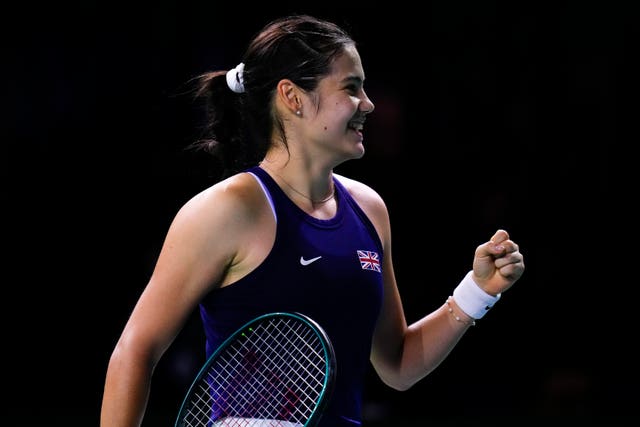
Friendship and team spirit are driving Great Britain towards a first Billie Jean King Cup final appearance for more than 40 years.
Anne Keothavong’s side will be favourites when they take on Slovakia in the last four in Malaga on Tuesday, with Katie Boulter and Emma Raducanu yet to drop a set in victories against Germany and defending champions Canada.
Including an upset victory over France on clay in the qualifiers in April, Boulter and Raducanu have won seven of eight matches between them and are proving quite the double act.
🫂 @katiecboulter & @EmmaRaducanu 🫂#BackTheBrits 🇬🇧 | #BJKCup pic.twitter.com/kxpyShYCxT
— LTA (@the_LTA) November 15, 2024
There is a genuine warmth between them, and Raducanu said: “We get on really well. I think we’re a really strong one-two combination in the singles.
“It’s great to play with her. She’s such a friendly girl, and I know we worked really well together in France, and now we’re doing the same again in Malaga.”
Heather Watson and Olivia Nicholls have not been needed yet as Britain’s doubles pair but are playing a key role in creating a fun team environment, while warm-up games of Spikeball – where players have to bounce a ball off a small trampoline – have also fostered high spirits.
“We’re just going to keep believing, keep trusting it, and just keep enjoying it,” said Boulter. “I think that’s really important. It’s worked so well for us so far.

“I don’t think there is any pressure. I think we’re just enjoying ourselves. Living with the girls it’s been honestly truly amazing and such a great week for me. I have enjoyed it and been so inspired to be around all these people.
“I know they’ve got my back so, no matter what happens, I’m just going to go out and do my best. I know they’ll support me.”
Captain Keothavong has a deeply personal reason for valuing close relations within her team.
The 41-year-old experienced a very different environment during her years as a player, when her rivalry with compatriot Elena Baltacha on court led to a rift off court that was fostered by those around the two players.
It was not until the latter stages of their playing careers that the pair found a friendship, but that was cut tragically short when Baltacha died of cancer 10 years ago aged just 30.
“What’s important for me in this competition is that the girls find a way to gel and get on. From my previous experience as a player, that wasn’t always the case.
“Myself and Elena Baltacha had our ups and downs but towards the end we were pretty tight. We were able as adults to reflect on how we could have been better, but also the people around us that influence us, who are the right people to listen to, who should we have just ignored.
“And when she passed away, you just kind of think, ‘Well, what was that?’ Because it was just such a waste to spend so much time being angry and p***ed off at each other and it was so totally unnecessary.”
While Britain have been hugely impressive so far, so have Slovakia, who boast victories over the United States and Australia.
An incredible final four remain in Malaga 🤩
But who will make it to the #BJKCup final? 👀 pic.twitter.com/wupAmiRSDj
— Billie Jean King Cup (@BJKCup) November 17, 2024
Number one Rebecca Sramkova upset world number 11 Danielle Collins on Thursday but is their only top-100 player, giving Britain the advantage on paper.
Should they reach the final, it would be their best showing in the competition since 1981, when a team boasting Virginia Wade, Sue Barker and Jo Durie were beaten finalists.
That is one of four final appearances in the event formerly known as Fed Cup, with Britain yet to lift the trophy.
“They’re not going to be easy,” said Keothavong of Slovakia. “They’ve got momentum in this competition.
“We have seen countless times how people are able to raise their level when they are representing their nation. But I go into it believing again that our players have the ability to get the job done.”


Why are you making commenting on The National only available to subscribers?
We know there are thousands of National readers who want to debate, argue and go back and forth in the comments section of our stories. We’ve got the most informed readers in Scotland, asking each other the big questions about the future of our country.
Unfortunately, though, these important debates are being spoiled by a vocal minority of trolls who aren’t really interested in the issues, try to derail the conversations, register under fake names, and post vile abuse.
So that’s why we’ve decided to make the ability to comment only available to our paying subscribers. That way, all the trolls who post abuse on our website will have to pay if they want to join the debate – and risk a permanent ban from the account that they subscribe with.
The conversation will go back to what it should be about – people who care passionately about the issues, but disagree constructively on what we should do about them. Let’s get that debate started!
Callum Baird, Editor of The National
Comments: Our rules
We want our comments to be a lively and valuable part of our community - a place where readers can debate and engage with the most important local issues. The ability to comment on our stories is a privilege, not a right, however, and that privilege may be withdrawn if it is abused or misused.
Please report any comments that break our rules.
Read the rules here